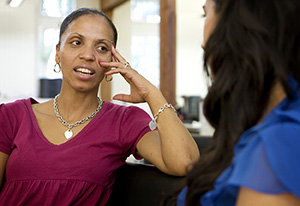Treating Posttraumatic Stress Disorder (PTSD) with Therapy
Posttraumatic stress disorder (PTSD) is a type of anxiety disorder. It can happen after you go through an extreme trauma, such as a car crash or combat. You constantly relive the trauma through nightmares, intrusive memories, and flashbacks with PTSD. Talk therapy (also called counseling) is a very helpful treatment for PTSD. Therapy with a trained professional helps you face and learn to manage your problem. It may take some time before you notice how much therapy is helping. But stick with it.

Cognitive behavioral therapy (CBT)
Cognitive behavioral therapy (CBT) teaches you to manage anxiety. It does this by helping you understand how you think and act when you're anxious. Research has shown that this treatment works very well for anxiety disorders. And this includes PTSD. CBT is run almost like a class. It involves homework and skill-building activities that teach you to cope with anxiety step by step. It can be done in a group. Or it can be one-on-one. It often takes place for a set number of sessions. CBT has 2 main parts:
-
Cognitive therapy. This helps you identify the negative, irrational thoughts that occur with your anxiety. You'll learn to replace these with more positive, realistic thoughts.
-
Behavioral therapy. This helps you change how you react to anxiety. You'll learn coping skills and relaxation methods. These will help you deal with anxiety in a whole new way.
Other forms of therapy
Other therapy methods may work better for you than CBT. Or you may move from CBT to another form of therapy as your treatment progresses. You may meet with a therapist by yourself or in a group. This depends on your needs. Therapy can also help you work through problems in your life that may be making your anxiety disorder worse. This includes drug or alcohol abuse.
Getting better with time
Therapy will help you feel better and teach you new skills. These will help manage anxiety long-term. But change doesn't happen right away. It takes a commitment from you. And treatment only works if you learn to face the causes of your anxiety. So, you might feel worse before you feel better. This can sometimes make it hard to stick with it. Remember: Therapy is a very effective treatment. The results will be worth it.
To learn more
Anxiety and Depression Association of America at www.adaa.org
National Alliance on Mental Illness (NAMI) at www.nami.org
National Institute of Mental Health at www.nimh.nih.gov